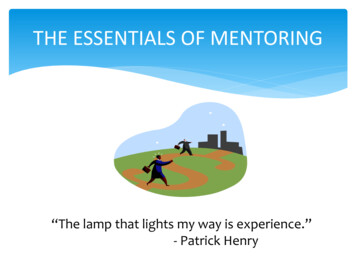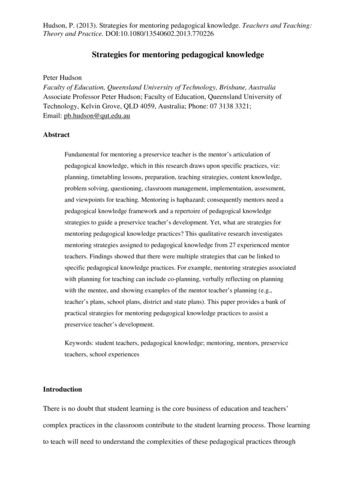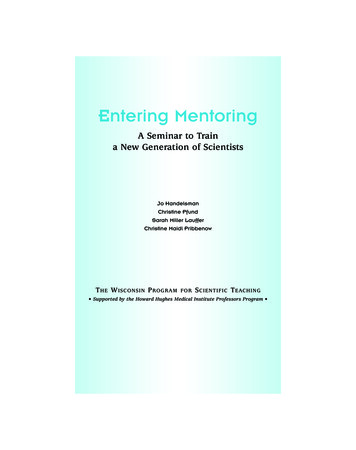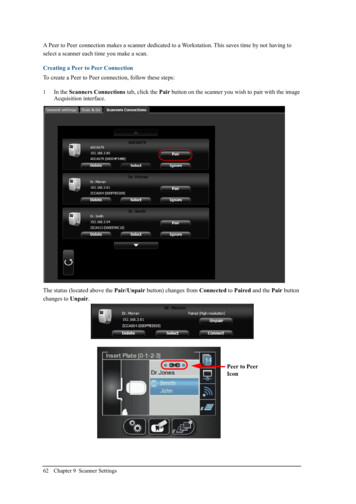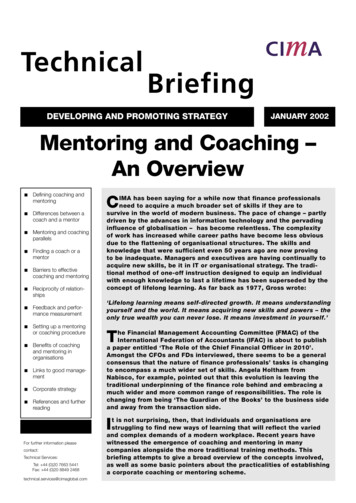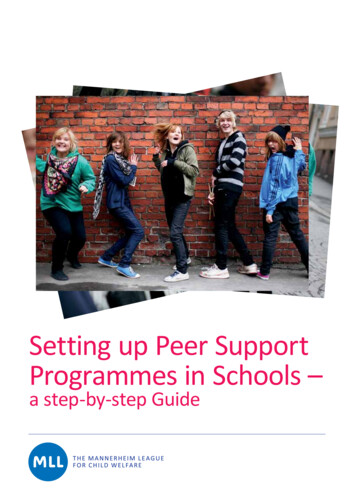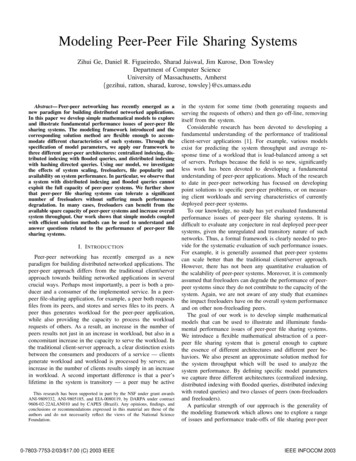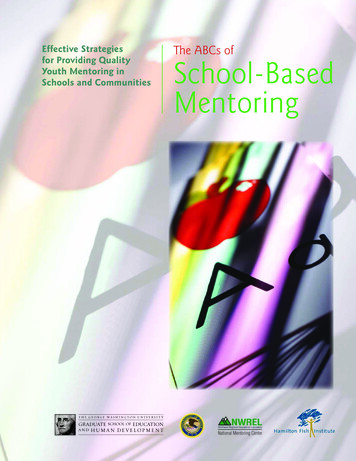
Transcription
The Street Scholars Peer Mentoring ProgramExecutive Director, Ronald L. Moss MSW**2017 MSW Candidate, The Graduate School of Social Welfare, University of California at Berkeley
The Gamble Institute: An OverviewFounded in October 2009 as a place for parolees, by parolees, The GambleInstitute's (TGI) mission is:To work with community members to provide relevant services and implementresearch projects that create meaningful knowledge to improve conditions forformerly incarcerated adults and their families.To date, over 400 men and women have participated in TGI programs.Our flagship program, the Street Scholars Peer Mentoring Program, is astudent services initiative located at Merritt College.Street Scholars is a program created and led by formerly incarcerated adultsand adults in recovery for substance and alcohol abuse.Its purpose is to support formerly incarcerated men and women’s academicand vocational achievement, substance use recovery, and achievement of longterm stability in the community.
Reintegration and Community Involvement
What We Know Recent scholarship suggests that peer support is important because many exoffenders view professional staff as irrelevant to their reintegration processsince they have no personal experience with incarceration or reentryResearch with prison inmates has shown that peer-mentoring programs,particularly those developed with inmate input, have greater rates ofparticipationOther studies indicate that post secondary education has a positive impact onrecidivism, especially when it is long-term and included with other supportservicesThe effect of peer mentoring on recidivism within the context of collegeeducation has not been fully explored, and how college level education affectsdrug and alcohol recovery and recidivism is not clearly understood.A 2012 review of formerly incarcerated Merritt College students, over a fouryear period (n 547), found that 63% did not complete one semester, 73% didnot complete an academic year, and less than 1% achieved an associatesdegree
In 2013, funded by AB109 Innovations In Reentry, the Street ScholarsPeer Mentoring Program was established as a student services programfor formerly incarcerated adults attending Merritt College.
AB109 Guidelines and Outcomes In 2014, Street Scholars was implemented as an 18-month pilotprogram. During the 2014-15 school year, 25 formerly incarcerated students wererecruited and enrolled into Street Scholars with 5-10 (20-40%)completing the pilot program. 19 scholars (76%) successfully completed Street Scholars’ three primarystudent outcomes: Completed courses with no failing grades or incompletes Avoided drug and / or alcohol relapse that disrupts academic program Avoided re-arrest or negative law enforcement contact that disruptsacademic program
Street Scholars Conceptual Framework
Street Scholars Program Model
Street Scholar Earthy Young at USFStreet Scholars at UC, DavisOur Research and TrainingEvaluates the impact of peer mentoring and post-secondaryeducation on the self-efficacy of formerly incarcerated students: Successful post-secondary academic attainment translates to successfulreentry and reintegration and reduced recidivismProvide consultation training sessions with masters students and otherpublic health and healthcare professionals
Qualitative Findings SummaryThe structure of school is beneficial to both recoveryand reduced maladaptive behaviorThe challenges to academic success are both intangibleand practicalPeer support is essential to academic successAcademic success enhances self-efficacy
The structure of school is beneficial to bothrecovery and reduced maladaptive behaviorCharles: “School helped me because I could be in thestreets grinding, selling dope, but I choose not tobecause I want to stay in school and finish what Istarted. So, it's really been a help for me to keep me upout of the streets. I know by me staying up out of thestreet, I'm staying up out of the penitentiary.”Sarah: “School gives me the discipline to be aware ofmyself when certain signals are triggered in me thatmake me want to drink.”
The challenges to academic successare both intangible and practicalMalcolm: “The biggest problem was acclimating socially because of mypast. I still think in terms of where I’ve been, 14 years behind the wallshas instilled in me certain values and belief systems, even in a collegesetting, somebody cuts in front of me in a bookstore line, I’m takingoffense to it. I have to shut down that type of mentality from time totime.”Steven: “And paperwork, comprehension, reading -- all the things that’srequired of you is that I need assistance to bring me back to the levelwhere I can do it on my own. I need help. Before, I wouldn’t allowpeople to help me. Today I surrender. And if you seek the resources,you can get the help that you need.”Evelyn: “I think the biggest problem has been organization and timemanagement.”
Academic success enhances self-efficacyBruce: “I started school here and my GPA was 1.56. I'm at a2.9 now - and it feels good because I never completedanything. And since I've been here, my mind is set that Iwant to complete something.”James: “I have learning disabilities. Coming to college andhaving that support system and then getting the A on theexam or getting the A on a paper or assignment, that's allthe confidence I need. I said I actually can do it.”Reginald: “And I'm getting cool grades, so, I'm liking it.Now, don't get me wrong, I done had a F too. So, I ain'talways felt good at everything, but, even a F, I done got backon it where I had to redo it and get something better.”
Peer support is essential to academic successBruce: “When I first came here [to Merritt] — lost — I was sitting atthe computer in the career center trying to pick my classes, and I can’teven remember the last time I sat in front of a computer. It had to beat least 12 years. And this dude walked up to me and said, “What youtrying to do, get your life together?” “Yeah, I am really!” And that’swhat I said! At first, it kind of shocked me, because this dude kind ofbig And he gave me the game And now it’s like you wouldn’tbelieve — in 18 months now it’s like I’ve got my home here. Thatdude was Ron That’s what peer mentoring is.”Robert: “Coming up here [to Merritt] was me seeing my own people.Seeing people just like me being successful in college. I'm seeing Blackinstructors; I'm seeing Blacks running the school; our president wasBlack; our Vice President was Black. I'm seeing brothers out therethat got their stuff together and they want to see other brothers doingwell, like I needed that.”
Preliminary Quantitative Findings(n 9 baseline participants)(n 6 completed baseline and four month surveys to date)Self-Efficacy Areas of Interest:academic and career clarity (7 point rating scale, 12items)academic self-efficacy (7 point rating scale, 8 items)self-regulated learning self-efficacy (7 point rating, 11items)drug and alcohol abstinence self-efficacy (3 point ratingscale, 11 items)tobacco abstinence self-efficacy (3 point rating scale, 7items)
Efficacy Domains* (n 6)Academic and CareerClarity1Baseline4 monthsAcademic1Baseline4 MonthsSelf-regulated Learning1Baseline4 monthsDrug and AlcoholAbstinence2Baseline4 monthsTobacco Abstinence2Baseline4 51.851.111.00.29.36.61.545.3, 76.5, 72.7, 6.84.4, 6.63.5, 6.63.8, 6.42.2, 32, 31.4, 31.7, 3Min, MaxDomain specific composites created by averaging respondent scores across relevant items1Items on a seven point rating scale2Items on a three point rating scale*
Summary of Survey ResultsGiven small sample size, results are suggestive ofchanges in specific efficacy domainsMean, standard deviation, and range differencesbetween baseline and 4 month surveys:Suggest improvements in academic and career clarity,academic, and tobacco abstinence self efficacy domainsBut, slightly different patterns emerge for self-regulatedlearning and drug and alcohol abstinence efficacydomain
3rd Annual CCREC Conference2015, Santa Cruz, CA9th Annual Correctional Health Conference2016, Baltimore, MD TGI’s research, scholarship, presentations, and publications validate Street Scholars asrespected content experts on the challenges of post-secondary educational attainment,substance abuse recovery, and the reentry and reintegration of the formerly incarcerated TGI has university fellowship affiliations with USF, UCSC, UCSF, UCD, and UCB
TGI Publications“But, Now, You're Trying to Have a Life: Family Members’Experience of Reentry and Reintegration,” published in AndJustice for All: Families and the Criminal Justice System (2015)“Peer Mentoring for Male Parolees: A CBPR Pilot Study,”published in Progress in Community Health Partnerships: Research,Education, and Action (2015)“Nurses, Formerly Incarcerated Adults, and Gadamer:Phronesis* and the Socratic Dialectic,” published in NursingPhilosophy (2014)“Nonviolent Communication and Empathy in Male Parolees,”published in The Journal of Correctional Health Care (2012)*Phronesis –”from the Greek for a type of wisdom or intelligence, more specifically a type of wisdom relevant to practicalthings requiring an ability to discern how or why to act virtuously and encourage practical virtue and excellence of character inothers.”
Community Partners for 2016-2017Merritt College, Provides Matching Services SupportCommunitiesw/ RenewingRound I: Community Capacity Fund, Alameda County Probation DepartmentInnovation in Reentry Continuation Grant, Alameda County BehavioralHealth Care Services (BHCS)The Extended Opportunity Programs and Services (EOPS), Merritt CollegeThe Community Social Services /Substance Abuse (COSER) Program atMerritt CollegeRoot and ReboundOpportunity Institute: Renewing Communities Five Keys Charter School Building Opportunities for Self-Sufficiency (BOSS)
New Projects for 2016 -17Explore opportunity for expansion to the other three PeraltacollegesIdentify the required elements of the Street Scholars program tobe replicated on each campusContinue to develop a program model that can be adaptedand replicatedImplement a comprehensive electronic data collection,information management, and program evaluation systemExpand current program capacity from 30 to 60 students inyear two and 80 students in year three
The ScholarsThe Leadership and Support Team
Shout Out to the Street Scholars Alumni and StaffAlumnus, Carl Massey; PC, La Juana Prince-Vaughn; Alumna, Stephanie Berry; and AD Earthy Young
Contact The Gamble Institute for parolees, by parolees TGI is located on the Merritt College Campus12500 Campus Drive, P-112Oakland, CA 94619510-436-2580Make inquires at:info@gambleinstitute.orgFind us on the Web at:http://www.gambleinstitute.org
education on the self-efficacy of formerly incarcerated students: Successful post-secondary academic attainment translates to successful reentry and reintegration and reduced recidivism Provide consultation training sessions with masters students and other public health and healthcare professionals


